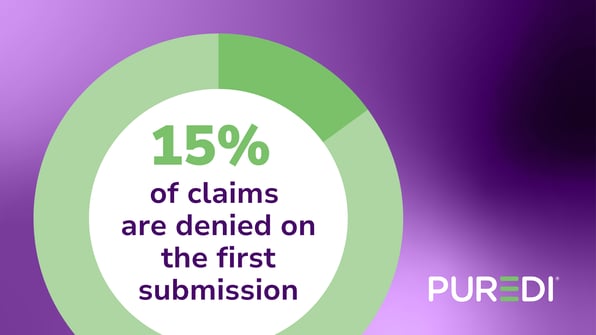The Cost of Apathy: How Much Are You Losing to Claim Denials

As a medical professional, you've probably become accustomed to claim denials. You may see them as a fact of life and write off some accounts as uncollectable before moving on to the next stack of bills. But this attitude could cost you unnecessary time and money. In 2022, providers spent almost $20 billion pursuing billing delays and claim denials.
You don't have to write off these costs. By shifting your processes and changing how you manage claim delays and denials, you can recuperate more of the money you're owed. Once you see how much you're potentially losing by accepting claim denials as a fact of life, you'll likely be motivated to change your ways and boost your cash flow.
Common Causes of Claim Denials
A claim denial can happen for many reasons, but the following tend to be the most common:
- Lack of specifics
- The diagnosis doesn't match the medical code
- The claim is missing information
- Your team didn't file within the insurance provider's timing window
- The patient's information is incorrect
- Duplicate bills
- Missing pre-authorization or referral information
Claim denials also fall into two categories: hard and soft. Soft denials are temporary, so you have time to correct and resubmit the claim. Hard denials are firm, meaning you don't have the opportunity to fix them. You can file an appeal to get payment on hard claims, but there's no guarantee you'll recoup your money. Inaccurate patient information, duplicate claims, and billing for uncovered services typically result in hard denials.
The Costs of Claim Denials
Failing to investigate and correct your claim denials is costly. An estimated 15% of claims receive a rejection the first time you submit them. If your annual revenue is $3 million, that amounts to $450,000 in lost revenue annually. You can use this denied claims calculator to find the exact impact on your business.
Even if you recover some money by investigating and resubmitting claims, you are still losing revenue. Researching claim denials and resubmitting them takes time. You essentially have to pay your billing staff to do the same job twice. A clean claim costs $6.50 to process, but it costs between $25 - $181 to fix and resubmit a claim.
Researching, fixing, and resubmitting claims also takes time your administrative and billing staff could use for other tasks.
Claim denials can impact your business in other ways as well. When providers deny medical claims, your patients may have to shoulder more of the financial burden for treatment, which makes them less satisfied with your practice. These patients could become more costly to treat in the long run. Nearly 50% of Americans said they delayed medical care because they didn't have enough money to cover unexpected costs within 30 days.
Patients who have denied claims rate their satisfaction levels 8.2 points lower than those whose claims are processed and approved. Excessive claim denials could tarnish your online reputation and cause you to lose business.
How To Prevent Claim Denials
You don't have to keep losing money on claim denials. Investigating and resubmitting your existing denials is the first step toward improving your revenue cycle management and boosting your cash flow. Then you can take steps toward submitting more clean claims the first time to reduce your denial rates.
Verify Patient Information Early
Start with a proactive approach to claims management. Encourage your billing team to verify patient information and insurance coverage when they check in.
Calling an insurance company upfront helps you establish which services are covered and which are not. If you know a service isn't covered, you can discuss it with the patient before providing it. For example, some eye doctors offer retinal scans and photographs with a machine instead of pupil dilation. Many insurance companies won't cover the scanning technology. If you know this before seeing the patient, you can ask them which option they prefer and collect payment for the retinal imaging at the time of service.
Invest in denial management solutions that flag errors before a claim leaves your office to prevent simple data entry errors.
Audit Your Existing Claims
As part of your denial management system, audit your claim denials and look for patterns. You may notice consistent errors. Once you've identified the root causes of your denials, you can change your processes or develop a more thorough training program to reduce errors.
File All Claims on Time
Every insurance provider has a set window in which you must submit claims for payment. Your billing staff should familiarize themselves with each provider's window so they can prioritize the claims with the shortest ones. When auditing your billing processes, note the average time it takes to process a claim. Ensure your team accounts for unforeseen delays in processing so they can submit all their claims within each payer's deadline.
Work With a Medical Billing Pro
Instead of tackling claim denials alone, work with a medical billing professional to process and submit your claims. Choose a partner with experience in the medical industry. Professionals familiar with your various codes can make your billing processes more efficient. Medical billing service providers will scrub claims before submitting them to reduce the risk of errors that cause denials. If you see denials, these companies take care of the follow-up and reconciliation for you.
Stop Losing Money on Claim Denials With a Trusted Medical Billing Partner
Your practice is likely losing stacks of cash to claim denials, but it doesn't have to remain that way. Streamlining your medical billing and claims submission process reduces your revenue cycle and improves your cash flow.
Partner with PUREDI to optimize your claim submission process and reduce your claim denials. We use our expertise and software to submit more clean claims the first time so you get paid in full for your services.
Contact us today to start collecting more money for your services.
Blog Post Tags
Denial ManagementGet Awesome Content Delivered Straight to Your Inbox!
Posts by topic
- RCM
- Medical Billing Software
- Outsource Your Medical Billing
- Compliance
- Physician Billing Services
- Denial Management
- AI
- Data Analytics
- EHR
- ERA
- reporting
- Automation
- Business
- Claim Scrubbing
- Coding
- Community
- Events
- LTPAC
- Medical Billing Companies
- Medicare
- Press Release
- Revenue Cycle Management
- business development
- clearinghouse See All See Less





